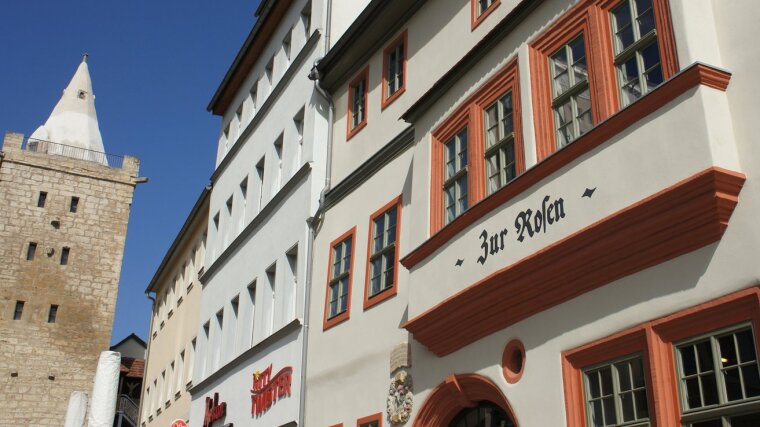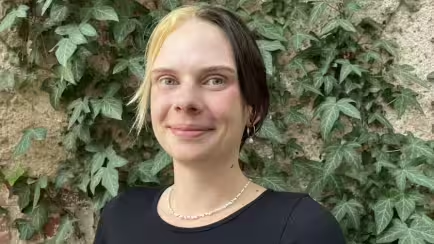
Carola-Barth-Preis
The Carola Barth Prize of the FZRB, endowed by the Evangelical Church in Central Germany, honors outstanding theses (Bachelor, Master, teacher's degree, diploma, church examination, etc.) that focus on the topic of religious education. This can involve historical, empirical, or systematic approaches; the thesis can have been written in any degree program offered at Friedrich Schiller University Jena.
The prize promotes students' research into religious education and has been awarded annually since 2015.
-
Who is Carola Barth?
Who Was Carola Barth? – Religious educator - Association representative - first woman in Germany to earn a doctorate in theology
Not long ago, Carola Barth (1879-1959) was one of the "forgotten mothers of modern religious education." Her rediscovery is due to a growing interest in the history of religious education and women's studies in theology over the past 15 years.
Carola Barth came from a middle-class family with a strong educational background in Frankfurt am Main. Her school and university years coincided with a period of radical change in girls' and women's education in Germany, with the turn of the 19th to the 20th century marking a crucial turning point. The demands of women's associations, which had been established in the 19th century, for equal schooling for girls and boys and for young women's access to university education were gradually met. Women were also admitted to the University of Jena in 1907.
At Easter 1899, Carola Barth passed her examination at the Frankfurt Teacher's Seminary, which formally gave her the qualification to teach in elementary schools, but did not yet open the door to university studies. As an auditor at a private girls' high school in Karlsruhe and with the support of private tutoring, she passed her Abitur (university entrance exam) in 1902 as an external candidate at the humanist high school in Hadamar. Carola Barth's choice of subject was significantly limited, and a teaching degree, alongside a medical degree, was the only option for women to pursue university education at the beginning of the 20th century.
Carola Barth began her studies in Protestant theology and history in 1902 in Bonn and Marburg. Both universities were considered open to female students. As one of the first women in Germany, Barth passed the "pro facultate docendi" examination for a teaching position at secondary schools on March 2, 1907, in Bonn and was granted teaching certification in religion and history for the upper grades and German for the middle grades.
However, at that time, it was not yet possible for women to earn a doctorate at the Faculty of Theology in Bonn. The fact that the academic climate in Jena was favorable for admitting female students and thus paving the way for women's doctorates, and was recognized as an urgent task as early as the late 19th century, is also confirmed by the Jena holiday courses, which were explicitly aimed at women's education.
After completing her studies and successful dissertation in Jena, Barth's career progressed quickly. At Easter 1908, she began her service as a teacher at the humanist Merlo-Mevissenschule in Cologne. In the fall of 1908, Barth undertook a research trip to excavation sites in Lebanon, Palestine, and Egypt.
After her return in 1909, she initially taught in Frankfurt am Main and was appointed head teacher there in 1911. Appointed director of the municipal lyceum in Cologne-Mülheim in 1921 and of the Mevissenschule in 1925, she was finally promoted to senior school director in 1926.
In 1934, the National Socialists ordered the closure of the Mevissenschule, and Barth was dismissed from her teaching position. In the same year, Barth joined the National Socialist Teachers' League because, as she later explained, she "wanted to maintain a certain connection to the school." She largely withdrew from the public sphere of school politics. In recognition of her services, the University of Königsberg awarded her an honorary doctorate in 1927. In a large number of publications, including monographs, essays, lectures, conference reports, reviews, and teaching materials, she advocated for a religious education based on developmental psychology and the history of religion. Her pedagogical interest was also explicitly dedicated to the education of girls.
Carola Barth's ideas on religious education align with the liberal theology and religious education of her time. She observed a growing alienation of young people from the institutionalized church while simultaneously noting their "honest desire for religion."
In terms of religious didactics, Barth refrained from an ecclesiological or catechetical justification for religious education. For Barth, religious education was not aimed at transmitting and acquiring a specific confession, but primarily at empowering students to form their own judgments about their religious state.
Barth recognized early on the need for political work within associations for religious teachers and church bodies. From 1913, she served as chairwoman of the Protestant-liberal "Association for Religious Education," which in 1920 merged with the "League for the Reform of Religious Education," founded in 1911, to form the "League for Religious Education and Religious Instruction," on whose board Carola Barth also served. As a representative for Protestant religious education, she participated in the German Protestant Church Congresses (DEKT) in Dresden (1919), Bethel (1924), Königsberg (1927), and Nuremberg (1930). In 1919, she was a member of the German Evangelical Church Committee (DEKA) and was sent as its delegate to the "General Conference for Practical Christianity," a precursor organization to the World Council of Churches, in Stockholm in 1925.
Carola-Barth-Preis 2025
Image: AI-generatedInterreligious & Intercultural Engagement in School and Society
Call for Submissions: Carola Barth Prize 2025
Submission Deadline: August 31, 2025
In 2025, we cordially invite you to submit contributions that critically engage with the multifaceted dynamics of confessions/beliefs, cooperation, and communication within the complex field of interreligious and intercultural dialogue.
We are particularly interested in academic works that address the following key areas, among others:
Interreligious and Intercultural Communication:
- How do different communities initiate, shape, and manage intercultural and interreligious dialogues?
- What challenges and new opportunities arise in fostering genuine understanding, mutual respect, and empathy across religious and cultural boundaries?
- To what extent does the understanding and practice of "confession" (in its various cultural and theological nuances) shape the landscape of interreligious and intercultural relationships?
- How do deeply held personal beliefs influence the processes and outcomes of interreligious and intercultural encounters?
- Can seemingly divergent strong beliefs serve as unexpected sources of both division and potential unity within diverse communities?
- What innovative models, successful strategies, and proven best practices exist for promoting effective interreligious and intercultural cooperation at local, national, and global levels?
- What role can educational institutions play in cultivating a culture of interreligious and intercultural understanding and collaboration?
- Which specific pedagogical approaches and resources are most effective in fostering the respect, empathy, and skills necessary for constructive engagement with differences?
We explicitly encourage submissions from all faculties. Self-nominations are very welcome.
The Carola Barth Prize is endowed with an award of 300 Euros and recognizes the significant contribution of insightful academic work to this important field.
Submission Guidelines: Please send your work as a PDF attachment via email to zrb@uni-jena.de by August 31, 2025. In the subject line of your email, please clearly state your submission with the following title format: (Your Name) - Carola Barth Prize 2025.
We look forward to your submissions!

